The Hubbard Continuum
New York, November 16, 1976
I opened the door to a man in his fifties, who looked familiar though I was sure I had never seen him before. ‘Can I help you?’
‘I know what you did,’ he said. He was chubby, with a lot of facial hair and a voice that carried. ‘I figured it out.’
‘I don’t know who you are,’ I said, ‘but if this is your idea of a joke…’
He stared at me for a long moment. ‘It’s me,’ he said. ‘Isaac.’
‘I’m sorry, ‘ I said. ‘Isaac…?’
He stared at me for a longer moment. ‘You really don’t remember.’ He put his hand on the door and said, ‘Can I come in? I think we need to talk.’
I began to tell him it wouldn’t be convenient and he pushed his way in and shut the door behind. ‘Sit down.’
He pointed to my brown television armchair and I sat down. He had a box with him, a machine of some sort, and he put it on the table beside me. He had a presence about him – not intimidating at all, but strong, like that of a man used to talking and used to being listened to.
‘Do you have any idea what it cost me to manufacture one of these?’ he said as he was attaching electrodes to my skin. ‘I had to go through six companies before someone was even willing to consider it, and it cost me as much as the royalties on a backlist paperback. It’s an e-meter.’
‘There’s some money in the fridge in the kitchen,’ I said. ‘You don’t need to torture me.’
He looked aghast, and I smiled. I felt fine, better than I have for some time. The man’s face were familiar, and something about his presence here felt right, somehow. And I knew he could no more torture a person than kill. Perhaps, I thought, I had known him in another life.
‘I want to talk to all of you,’ he said. He busied himself around the box, mumbling to himself, then said, ‘ah, here it is,’ and he hit a switch –
And my mind exploded, tiny shards streaming into infinity –
My mind, a broken mirror of infinite parts, reassembled itself and –
I was suddenly whole.
I opened my eyes (I hadn’t realised I’d closed them) and saw him staring at me again.
‘I think there was a war,’ he said. He looked into my eyes, seeking confirmation, and I slowly nodded.
Then I was no longer there.
Mars. 3050 (1050 Post-Astounding)
I was the OC of a battle company in the Fifth Pre-Clear War of 1050 when I discovered the portal.
It lay under the Valles Marineris and it was an implant station, just like the ones Hubbard first wrote about in his The History of Man a millennium ago. We had been fighting the Pre-Clears on Mars for a long time: so long that one of the moons was now missing (a Genetic Entities attack in 756) and the planet was pockmarked with giant new craters. I was an Operating Clear, having first assumed my Thetan form in 2041 by the old count, 91 by the new: and now I was in charge of a bunch of rookie just-become-Clears who did their best to get me killed. Again.
The implant stations haven’t been operating for some centuries. I was under the impression all have by now been discovered and destroyed (including the one in the Pyrenees Hubbard wrote about) but clearly I was wrong.
We had to get off the surface. The Pre-Clears were bombarding the area from orbit while they still had forces on the ground. Somewhere north there was an underground habitat full of enemy soldiers, and our orders were to find it.
We needed an opening into the Martian underworld and the Pre-Clears provided us with one. A rock smashed into the ground a few kilometres from us, and when we reached it we found it had uncovered – with the displacement of huge amounts of Martian sand – the opening we needed.
At first it looked like an old mining shaft, perhaps leading to a small abandoned habitat of a settlement-year kibbutz. But the visions came, sharp and painful, opening up old engrams – old psychic scars. It was an implant station, and my first instinct was to blow it up.
But there is more to these old Thetan stations than you might think. They imprint the incorporeal with engrams, yes, but they are more than that: in the science fiction books and magazines I studied in my Pre-Clear days they would have been called portals, time machines, weapons shops.
I told my company to get out of there. It wasn’t safe for me – for them it would be suicide. I told them to find another entrance and to lie low, and wait for me. I served with one of the peace-keeping teams that dismantled the implant stations back during the Decommissioning, and I knew what to do.
The war…
The war had been going on for seventy five million years or just under a thousand. It depends on your perspective. Whichever way, I was tired of it. Not even sick anymore, just tired. I had memories of many incarnations as a Genetic Entity, a GE. Of bodies, of sensations, of small things and big, all gone down the long years.
And I knew what to do. You see, back in old-count 2040 I studied science fiction.
New York. July 2nd, 1939 (11 Pre-Astounding)
A gawky kid with an awkward moustache was climbing up the stairs and nearly bumped into me. Behind him his friends were skulking away: one of them shouted about the ‘right of the Futurians to…!’ before ebbing away in indignation. I paused to watch them go back to the automat across the street, where they will sit for the rest of the day. I recognised, from centuries-old photos, Donald Wolheim, Cyril Kornbluth, Damon Knight and James Blish. Fred Pohl wasn’t there yet – I knew he had dental problems that day. When I was a research student I dreamed of meeting some of these men – boys, really, at this place and time – and being here now, nearly a millennium later and a century before – depending, again, on your perspective – felt strange. It felt good though, and I wished I could just forget the long centuries and the mission I had to accomplish. I turned and watched the sign above the door: The First World Science Fiction Convention.
I walked inside, nodding to the burly guy who turned the Futurians away – Sam Moskowitz, an early SF fan – and caught up with the young man I met on the stairs.
‘You’re Isaac Asimov, right?’ I said. He turned and beamed at me in gratitude, looking lost. ‘I think your stories are really good,’ I said. He blushed and said that I was very kind. ‘It’s all thanks to Campbell,’ he said. ‘He’s the best science fiction editor in the world.’
‘Listen, kid,’ I said. I thought out my moves carefully before setting the portal to these coordinates, and I had a plan. I even had a name, cobbled together from those of two old SF editors in the late twentieth-early twenty-first. ‘My name’s Gordon Hartwell. I’m editing a new magazine.’ I watched him, as eager as a puppy. ‘ I’m looking for stories. Can we talk?’
‘Gee, that’d be great,’ Asimov said. ‘You want me to write a story for you?’
‘I sure do,’ I said. ‘And we pay three cents a word.’
‘Three cents! Even Campbell doesn’t…’
‘No,’ I said. ‘He doesn’t. Not yet.’
It was working. And I liked the kid. But then I saw the Thetans.
It was the old Time Keeping force. ‘Join the Time Keepers! See the wonders of the past!’ ran their recruitment tagline back when they first started in the 460s. The implant stations on Mars were operating in full-capacity then, and the force sent back thousands of new Clears to patrol the Hubbard continuum, ensure the survival of the teachings.
‘Keep this quiet,’ I said. ‘I’ve got to go, but I’ll speak to you soon. OK?’
‘Sure, Mr. Hartwell,’ Isaac Asimov said. He turned and waved to someone in the crowd. It might have been Campbell. ‘But you just got here!’
I was already turning away. The Time Keepers were circling around the room, looking like average SF fans of the thirties, which meant they looked both young and poor. They spotted me, knew I wasn’t supposed to be there. I hadn’t realised the extent of the protection before: and I walked away and adjusted the psychic link with the portal and –
New York, January 4, 1940 (10 Pre-Astounding)
I stopped Isaac in the street just before he entered the building. His face lit up and he said, ‘Mr. Hartwell! Have you come to see Campbell?’
‘Partly,’ I said. ‘I want us to finish our talk.’
‘Your magazine?’ he said. ‘I didn’t see it on the newsstands.’
‘It’s coming,’ I said. ‘The economic situation isn’t right for it yet. But I still want a story from you?’
‘The one you talked about?’ he said, startling me for a moment. Then I realised that I must have managed to talk to him after all. ‘I don’t know. It doesn’t sound very scientific.’
‘Listen, kid,’ I said. ‘Whatever you do, don’t mention it inside, ok?’
‘Mr. Hartwell,’ he said, looking offended. ‘I keep my word.’
There was a solitary Clear coming around the corner, garbed in the disguise of a homeless woman with too many coats. I pushed Isaac inside with me.
I had read about that meeting. I never imagined I would gate-crash it one day. Campbell seemed pleased to see me and called me Mr. Hartwell, though I haven’t met him yet, not in my own chronology. A blond thin man I recognised as Ted Sturgeon was talking to a man with a thick German accent whose name was Willy Ley. There were me, Isaac… And then there was Hubbard.
He was large and red-haired, confident, easy-going. He had not yet become the prophet that he was, but in a few short years he would discover the truth and begin publicizing it. I shook his hand.
When young Isaac was introduced to Hubbard he said, ‘You don’t at all look like your stories.’
‘Why?’ Hubbard said, and I could tell he was amused. ‘How are my stories?’
‘Oh, they’re great,’ Isaac said enthusiastically, and everyone laughed as he tried to explain that he didn’t mean Hubbard wasn’t great.
At some point I took Campbell aside. We had a brief chat, but I managed to plant in his mind – I hoped – some of the things I needed. Then I stepped down to the street and –
Mars. 3050 (1050 Post-Astounding)
The implant station was vibrating. I stumbled to a comms. unit and tried to reach my company, but there was no response, and silver screens showed me only dust on the outside, the result of constant bombardment from orbit. Something moved in the shadows and I instinctively ducked, just in time: a psychic Thetan death-ray nearly cut me in half.
There were three of them, Time Keepers. They must have tracked me back here, must have understood the danger I posed to them. I disabled one with an engram that seared him, dispatched another to the long bodiless journey. The third came at me and punched me in the face, sending me across the floor. I tried to rise, spat out a tooth.
‘What are you trying to do?’ the Time Keeper shouted. ‘You are an Operating Clear! A soldier against the Pre-Clear aggressors! This is betrayal!’
I looked at him from my point on the floor. There was no arguing with a Time Keeper. So I shot him.
I watched the Thetan souls depart, invisible to anyone but an OC, and I tried again.
New York. July 2nd, 1939 (11 Pre-Astounding)
Isaac was talking animatedly to Campbell and to a man I thought was L. Sprague de Camp. It was the First World Science Fiction Convention again – a pivotal point in the history of the human race, though not as important as that single date, May 1950, that truly changed the path of history. It was the event of May 1950 that I fought to change.
‘Isaac!’ I called out. He turned and looked in my direction and waved. I walked over, warping my Thetan aura this time to try and evade the Time Keepers, though I didn’t expect to be able to stay long – and shook Campbell’s hand for the second time. ‘It is a pleasure, sir,’ I said, and he grinned and told me not to be so formal.
I looked into his eyes, growing serious. ‘Isaac is a very talented writer,’ I said. Campbell nodded mildly and said he thought so, too. We had moved away from Asimov (he was talking to Nelson S. Bond) and I said, ‘he will come to you soon with an important story. The most important story of his career, and yours. When the time comes, I hope you remember that, and accept the story.’
‘If it’s good, Mr. Hartwell,’ he said, ‘then I will publish it.’
‘Oh, it will be good,’ I said. ‘I believe in Isaac.’
‘He has a way to go yet,’ Campbell said, ‘but if he keeps going, I think he will make it.’
I shook his hand again, then retreated towards the exit. I could sense more Time Keepers materialising in the shadows, no doubt planning to close a ring around me, and so I –
Philadelphia. December 2nd, 1944 (6 Pre-Astounding)
Hubbard was playing the guitar and singing I Learned About Women from Her, and Isaac – a fuller, slightly-older version, and accompanied by his new wife – was sitting quiet for once. I also recognised de Camp – and Heinlein.
Robert Heinlein should have been my first choice, but I was afraid that his own expansive personality and experimentation would lead – were he faced with the same set of facts as Hubbard – to a not-dissimilar pursuit of the truth. Isaac, I felt sure, would not believe a word of it.
I watched them through the windows. It was late, but peaceful. So far I had not sensed any other Thetans. Finally, Isaac and his wife left, and I followed them until I was convinced we were alone. I revealed myself.
‘Gordon! What are you doing here?’ He seemed pleased to see me, and on more familiar terms than I remembered. ‘I’m working on the story now. It’s such a great idea! The words just seem to flow – almost as if I was just reporting on something that really happened, not making it all up as I go along. I’m thinking of tying it in to my Foundation stories – they’re very popular, you know.’
He introduced me to his wife, Gertrude. She wore a low-cut dress (I had seen Heinlein ogling her throughout the evening) and seemed uncomfortable in it. Isaac kept referring to her as ‘My Wife’, with the capitals pronounced. ‘Listen, Isaac,’ I said. ‘I have to go away for a while. I can’t discuss it – you can guess what it concerns.’
His mouth formed an O and he nodded. ‘This is an evil war,’ he said. ‘I hope you don’t put yourself in danger.’
‘I’ll be fine,’ I said. ‘But about the story. If I’m not back and can’t buy it from you – sell it to John, all right? Don’t take no for an answer.’
He smiled, pleased with himself. ‘I already did,’ he said. ‘Campbell’s really interested in this one. Though I must say he is taking the idea a little too seriously. But of course the story is yours first, Gordon.’
‘I think I might have misled you,’ I said. ‘I don’t know if the magazine is going to work out. I might not come back. Write the story, Isaac. And let Campbell publish it. Don’t let me down.’
‘I won’t,’ he said mildly. His eyes searched my face and I saw a look in his eyes I didn’t want to see there. ‘Don’t ask me any questions,’ I said quickly and, shaking his hand and Gertrude’s, I walked away and –
New York, November 16, 1976
I was still in the chair. The e-meter was still connected by electrodes to my skin. Isaac towered above me, waving an old magazine. ‘You made me write the story, and had me sell it to Campbell. You never had a magazine. You’re a time traveller. You’re one of them. A Thetan.’
‘How did you figure it out?’ I said. I felt tired. There had been more jumps, more trips across the Hubbard continuum. Several more before the change worked and I hid in the new time-line, a bachelor in a one-bedroom apartment in New York, with no memories but the ones that belonged here, in this time and place.
‘I worked it out. I heard some of what Hubbard was trying to tell people in the late ‘40s. but he had a problem, didn’t he? I already wrote about his discoveries! I wrote about Thetans, and implant stations, and becoming an Operating Clear. Here –‘ he handed me the magazine. ‘I brought this for you.’
I looked at it. An old copy of Astounding. The May, 1950 issue. The one that should have run Hubbard’s article on Dianetics: when he failed to drum up interest in his new teachings from the mainstream he turned to the SF magazines. A whole new science and a whole new religion, launched on the back of this one publication in Astounding.
There was an atmospheric painting of Mars on the cover, with a small group of Thetans ringed by Pre-Clears with heavy weaponry. No other contributors were mentioned on the cover. It said, only, “The Scientologists, by Isaac Asimov”.
‘My most successful work to date,’ Isaac said bitterly. ‘It overshadows my Foundation series, my Positronic robots stories, everything. But I only want to know one thing, Gordon. Did I do the right thing?’
I looked at him, looked at the bare room I inhabited, a man displaced in time, living in a New York that shouldn’t have existed, in a world where the one true messiah was forgotten and his teachings were considered science fiction. I knew it was the right thing: the rise of the Clears in my history led to a violent opposition by the Pre-Clears, and within the Thetan ranks, too, the conflict over the implant stations and over genetic resources had led to a wasteland Earth and a ruined Mars. But I looked at myself, trapped in one body, one incarnation, devoid of the greater truths, and I thought too about Hubbard, who I opposed despite his greatness, who I had reduced against my will so that the movement he would have founded never became a reality, and my future became a fantasy.
‘Destroy the e-meter,’ I said. ‘It shouldn’t exist in this version of history. There might still be Time Keepers about, trapped in the loop.’
He didn’t answer. His mild eyes looked at me and demanded an answer. What could I tell him? I thought about the war, about the implant stations, about the engrams I had suffered. All now belonging to a future that never was, and will be no more.
‘We were never meant…’ I said, and the true sadness of it finally settled in me and filled me, and I knew Isaac would understand. ‘We were never meant to be the race that would rule the sevagram.’
The End
Lavie Tidhar grew up on a kibbutz in Israel and has since lived in South Africa, the UK, Vanuatu and Laos. He is the author of steampunk novels The Bookman (2010) and forthcoming Camera Obscura, literary novel Osama, and weird SF novel Martian Sands (all three in 2011). He is also the author of linked-story-collection HebrewPunk (2007), novellas Cloud Permutations (2010), An Occupation of Angels (2005 UK; 2010 US), and Gorel & The Pot-Bellied God (also in 2011) and is a prolific short story writer. Keep up with him at his entertaining blog.

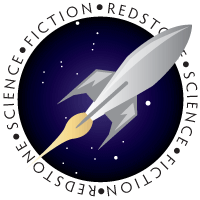
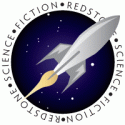



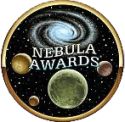
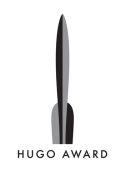
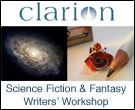



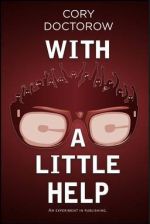
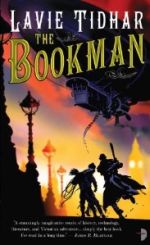
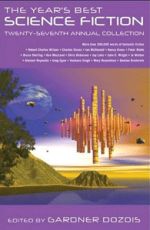


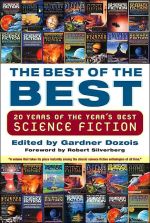
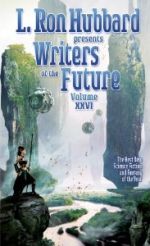

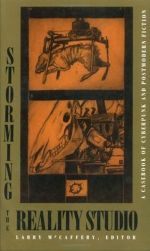



8 comments
[…] The Hubbard Continuuum by Lavie […]
[…] of publishing two stories that are simply outstanding. When we reached Lavie Tidhar’s The Hubbard Continuum among our submissions, there was a flurry of emails and texts. “Read this now!” was the […]
[…] latest short story has just been published – The Hubbard Continuum, at the very cool Redstone […]
The Hubbard Continuum | Redstone Science Fiction…
Here at World Spinner we are debating the same thing……
[…] month’s story from Lavie Tidhar, The Hubbard Continuum, is a lot of fun. It takes Scientology at its word and considers the implications. Lavie is a […]
[…] http://redstonesciencefiction.com/2011/03/the-hubbard-continuum/ Posted by Blue Tyson 3.5, science fiction, t short story, z free sf Subscribe to RSS feed […]
[…] addition to Redstone Science Fiction publishing my story The Hubbard Continuum this month, they have also taken the time to ask me a few questions. This month’s story from […]
[…] Science Fiction The Hubbard Continuum by Lavie Tidhar Perfection by Jay Garmon Brittlestar by Mike Barretta First Light by Patrick […]